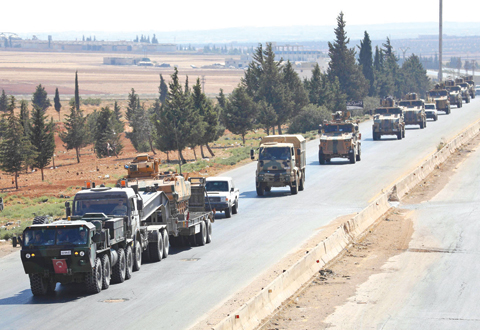Russia hopes West won't 'obstruct anti-terror operation' in Syria
 SARAQIB, Syria: Turkish forces are seen in a convoy on a main highway between Damascus and Aleppo, near the town of Saraqib in Syria’s northern Idlib province yesterday. — AFP
SARAQIB, Syria: Turkish forces are seen in a convoy on a main highway between Damascus and Aleppo, near the town of Saraqib in Syria’s northern Idlib province yesterday. — AFPJERUSALEM: Israel yesterday renewed its threat to attack Iranian military targets in Syria, after the two Muslim allies signed an accord on security cooperation. "The accord concluded by (Syrian President) Bashar Al-Assad and Iran constitutes a test for Israel: Our response will be loud and clear," Intelligence Minister Yisrael Katz said on Israeli public radio. "We will not allow Iran to establish itself militarily in Syria," he said. "We will react in Syria with all our might against any Iranian target that threatens Israel, and if the Syrian army's air defense intervenes against us, it will pay the price." Iran's military attache to Damascus said Tuesday that his country's military advisers would remain in Syria under the defense agreement signed the previous day.
"Support for Syria's territorial integrity and the independence of Syrian sovereignty were also emphasized in the agreement," Brigadier-General Abolghasem Alinejad said. Tehran has provided steady political, financial and military backing to Assad as he has fought back against a seven-year uprising. Israel has sought to avoid direct involvement in the conflict but acknowledges carrying out dozens of air strikes in Syria to stop what it says are deliveries of advanced weaponry to its Lebanese enemy Hezbollah. It has also pledged to prevent its arch foe Iran from entrenching itself militarily in Syria and a series of strikes that have killed Iranians in Syria have been attributed to Israel.
Anti-terror operation
Meanwhile, Russia yesterday called on the West not to stand in the way of an "anti-terror operation" in Syria's Idlib, as speculation grows Damascus is planning a Russian-backed offensive on the rebel-held province. "I hope our Western partners will not give in to (rebel) provocations and will not obstruct an anti-terror operation" in Idlib, foreign minister Sergei Lavrov said at a press conference with his Saudi counterpart Adel al-Jubeir in Moscow. Lavrov also said that there is "full political understanding" between Russia and Turkey, who support opposing sides of the Syrian civil war but are currently in intense negotiations to ensure Idlib does not become a breaking point in their alliance.
"It is necessary to disassociate the so-called moderate opposition from terrorists and at the same time prepare an operation against them while minimizing risks for the civilian population," Lavrov said. "This abscess needs to be liquidated." Lavrov went on to accuse the West of "actively heating up" the idea of a "so-called planned chemical attack by the (Syrian) government." Over the last week, Moscow has accused Syrian rebels of planning to stage a chemical attack in the northwestern province that would "provoke" Western strikes on its ally Damascus.
It also accused British secret services of being "actively involved" in the plot. Moscow's accusations came after US President Donald Trump's national security adviser John Bolton said Washington will respond "very strongly" if Syrian regime forces used chemical weapons to retake Idlib. This week Russian media reported Moscow is reinforcing its military presence in the Mediterranean near Syria. In April, the US, France and Britain launched joint missile strikes on Syrian targets in response to an alleged chemical weapons attack in the town of Douma that left scores of people dead.
Russian stuck by its ally Syria and angrily insisted the Douma attack was staged by the White Helmets volunteer rescue service. Russia, a long-time ally of Syria, launched a military intervention in 2015 to support the embattled regime of President Bashar al-Assad, a move that changed the course of the war. Damascus still holds the southeastern tip of Idlib, a strategically important province adjacent to Latakia on the Mediterranean coast that is home to Assad's clan. More than 350,000 people have been killed and millions displaced since Syria's war started in 2011 with the brutal repression of anti-government protests.- Agencies










